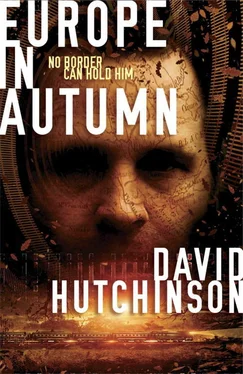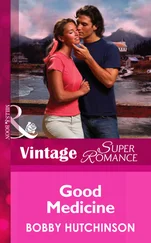The cobbler kept looking at him. “You’re very young.”
This seemed impossible to argue with. Rudi shrugged.
“Change the colour of your hair,” said the cobbler. “Grow a moustache.”
“I don’t have time to grow a moustache.”
“Well have your hair cut,” the cobbler said testily. “You have time to visit a barber? Alter your appearance somehow. No one ever looks exactly like their passport photograph; it makes immigration officers suspicious if they do.”
“Perhaps I could wear a hat,” said Rudi.
The cobbler looked at him for a few moments longer, then shook his head sadly. He went over to the phone and started to fiddle with its little roll-up tapboard. “And of course the Zone has these paper passports,” he said, looking intently at the phone’s screen. He shook his head at something, poked the tapboard several times. “Silicon is so much easier.”
“It’s supposed to be more difficult.”
The cobbler shook his head again. He rapped the phone with a knuckle. “With silicon, I can do everything in here. With paper… well, you must find the correct paper, the correct inks, the correct stamps… much more difficult.”
“Right,” said Rudi.
“My pianist took ten minutes to hack the Zone’s immigration computer and update your legend’s records. Where’s the security there?”
“Right,” said Rudi.
“Everyone should produce passports like this,” the cobbler went on. “Any pianist can hack a silicon passport, but it takes an artist to work with paper and ink.”
“Right,” said Rudi.
The cobbler glanced up from the screen. “You probably believe you know everything.”
“That’s the first time anyone’s accused me of that ,” Rudi told him.
The window of the cobbler’s shop looked out over a landscape of sharply-pitched roofs broken by chimneypots and about a hundred different types of radio, television and satellite antennae. In the far distance, Rudi could see the cranes of the Gdańsk shipyards. The shipyards had gone bust sometime during the early part of the century, and the land was now occupied by trendy apartment blocks and studios for artists and those little design firms no one ever quite understands the purpose of. The cranes had been preserved, as historical monuments, although nobody could agree who was supposed to be maintaining them so they were slowly and quietly rusting away.
The cobbler’s shop itself was clearly one of Central’s myriad temporary spaces, rented by a stringer on a monthly basis for whatever brief occupancy circumstances dictated. A dusty boxroom right at the top of a tall brick-built rooming house, floored with lino that looked as if it dated back to the Second World War. A pile of teachests stacked over in one corner, an ancient wooden rocking-horse under the window. The cobbler’s equipment could be packed into two medium-sized attaché cases and moved from place to place as circumstances demanded. The cobbler himself was as anonymous as the room. Small, slight and middle-aged, with a receding hairline and battered, slightly old-fashioned clothes.
“You speak Estonian?” he asked, reading the laptop’s screen.
“I can get by,” said Rudi.
The cobbler nodded. “Your Polish is very good,” he said, looking at the screen again. “But you’re from up the coast somewhere; I can hear your accent.”
Rudi took a battered bentwood stool from a stack in the corner of the attic, set it right way up, sat down, and folded his hands in his lap.
“I know,” said the cobbler. “None of my business. Everyone in the Zone speaks English, anyway.” He took from his pocket a small parcel wrapped in what appeared to be chamois leather. Unwrapping it, he held up a thin little book with laurel-green covers. Its front cover was gold-stamped with an extremely stylised eagle and some writing.
“Worth more than its weight in gold,” he said. “Literally. Virgin; never used. Bring it back.”
“All right,” said Rudi.
The cobbler opened the passport and laid a thin sheet of transparent film over one of the pages. Then he fed the whole thing into one of the little boxes connected to the phone.
“We don’t get many of these,” he said, and Rudi wondered if he meant virgin passports or something else. He typed a couple of commands into the tapboard and a moment later the box ejected the passport. He stripped the film away and Rudi saw that his photograph and some printing were now embossed on the page.
“Actually,” he said, rooting around in one of his cases, “they’ve been very clever.”
Rudi tried to feign interest. “Oh?”
“Not many people these days have the paraphernalia to do work like this successfully.” He took from the case two stamps and two ink-pads. “I had to mix the inks myself. Specific fluorescences, magnetic particles. Very tricky.”
Rudi looked at his watch.
The cobbler carefully inked the stamps and inserted the residence visa and work permits. Then he took out a gorgeous antique Sheaffer fountain pen and dated and initialled the stamps. Then, with several other lovely pens, he signed several different signatures.
“Then, of course, they have to spoil it all.” He typed another couple of commands and another little box ejected a narrow length of plastic printed with a barcode. The cobbler stripped off the backing and pressed the barcode onto the final page of the passport.
Finally, he opened the passport at a number of different pages and flexed the spine back and forth. Then he closed it and bent it between his hands. Then he leaned down and rubbed both covers and the edges on the dusty floor.
“Congratulations,” he said, holding the passport out to Rudi. “You’re Tonu Laara.”
“Thank you,” Rudi said, taking the passport. “And it’s pronounced Tonu .”
The cobbler smiled. “There. I like a man who knows how to pronounce his Christian name.”
THE POLES BEGAN to arrive a couple of days before New Year’s Eve.
First to arrive, on the 29th, were about a dozen in three cars with skis strapped to their roof-racks. They all seemed to know each other, booked into their rooms, and went straight back out onto the slopes.
Early that evening, a coach arrived bearing about thirty more, all of them loaded down with ski equipment. From his hatchway Rudi watched them at the evening meal, deriding the food and calling good-natured insults to each other.
The next day, more cars and another coach. It was a package tour organised by some firm in Upper Silesia, Jan confided.
“They stop off in town and buy up all the alcohol in the supermarket and then come up here and drink like madmen,” he said.
“Why?” asked Rudi.
Jan gave a great expansive shrug as if to demonstrate that the motivations of Poles were as mysterious to him as the workings of the cosmos.
Whatever. Most of the first coachload of Poles left the hotel and strapped on their skis almost as soon as the sun came up over the far peaks the next morning. The rest stayed in their rooms and began to drink their purchases, and when the second load arrived in the early afternoon, already loudly drunk, there were some fights between the two groups.
Rudi was familiar with some of these people. The skiers were just ordinary Poles, here to have a good time on the slopes and spend a nice New Year’s Eve. The drinkers were in their mid-twenties and well-dressed, young Polish entrepreneurs who had made a lot of money very quickly and wanted to take their girlfriends on a cheap, loud, boozy holiday. At dinner that evening there was a lot of shouting and some food was thrown. Later on there were more fights, discharged fire extinguishers, weeping girlfriends running screaming down the corridors with their mascara smeared in long black teary streaks.
Читать дальше







